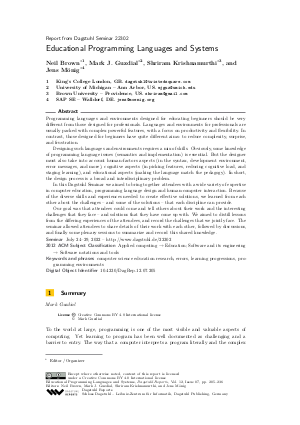Educational Programming Languages and Systems (Dagstuhl Seminar 22302)
Authors Neil Brown, Mark J. Guzdial, Shriram Krishnamurthi, Jens Mönig and all authors of the abstracts in this report
-
Part of:
Issue:
Dagstuhl Reports, Volume 12, Issue 7
Part of: Volume: Dagstuhl Reports, Volume 12
Part of: Journal: Dagstuhl Reports (DagRep) - License:
 Creative Commons Attribution 4.0 International license
Creative Commons Attribution 4.0 International license
- Publication Date: 2023-02-03
File

PDF
DagRep.12.7.205.pdf
- Filesize: 1.57 MB
- 32 pages
Document Identifiers
Subject Classification
ACM Subject Classification
- Applied computing → Education
- Software and its engineering → Software notations and tools
Keywords
- computer science education research
- errors
- learning progressions
- programming environments
Metrics
- Access Statistics
-
Total Accesses (updated on a weekly basis)
0PDF Downloads0Metadata Views
Abstract
Programming languages and environments designed for educating beginners should be very different from those designed for professionals. Languages and environments for professionals are usually packed with complex powerful features, with a focus on productivity and flexibility. In contrast, those designed for beginners have quite different aims: to reduce complexity, surprise, and frustration. Designing such languages and environments requires a mix of skills. Obviously, some knowledge of programming language issues (semantics and implementation) is essential. But the designer must also take into account human-factors aspects (in the syntax, development environment, error messages, and more), cognitive aspects (in picking features, reducing cognitive load, and staging learning), and educational aspects (making the language match the pedagogy). In short, the design process is a broad and interdisciplinary problem. In this Dagstuhl Seminar we aimed to bring together attendees with a wide variety of expertise in computer education, programming language design and human-computer interaction. Because of the diverse skills and experiences needed to create effective solutions, we learned from each other about the challenges - and some of the solutions - that each discipline can provide. Our goal was that attendees could come and tell others about their work and the interesting challenges that they face - and solutions that they have come up with. We aimed to distill lessons from the differing experiences of the attendees, and record the challenges that we jointly face. The seminar allowed attendees to share details of their work with each other, followed by discussions, and finally some plenary sessions to summarize and record this shared knowledge.
Cite As Get BibTex
Neil Brown, Mark J. Guzdial, Shriram Krishnamurthi, and Jens Mönig. Educational Programming Languages and Systems (Dagstuhl Seminar 22302). In Dagstuhl Reports, Volume 12, Issue 7, pp. 205-236, Schloss Dagstuhl – Leibniz-Zentrum für Informatik (2023)
https://doi.org/10.4230/DagRep.12.7.205
BibTex
@Article{brown_et_al:DagRep.12.7.205,
author = {Brown, Neil and Guzdial, Mark J. and Krishnamurthi, Shriram and M\"{o}nig, Jens},
title = {{Educational Programming Languages and Systems (Dagstuhl Seminar 22302)}},
pages = {205--236},
journal = {Dagstuhl Reports},
ISSN = {2192-5283},
year = {2023},
volume = {12},
number = {7},
editor = {Brown, Neil and Guzdial, Mark J. and Krishnamurthi, Shriram and M\"{o}nig, Jens},
publisher = {Schloss Dagstuhl -- Leibniz-Zentrum f{\"u}r Informatik},
address = {Dagstuhl, Germany},
URL = {https://drops.dagstuhl.de/entities/document/10.4230/DagRep.12.7.205},
URN = {urn:nbn:de:0030-drops-176165},
doi = {10.4230/DagRep.12.7.205},
annote = {Keywords: computer science education research, errors, learning progressions, programming environments}
}
